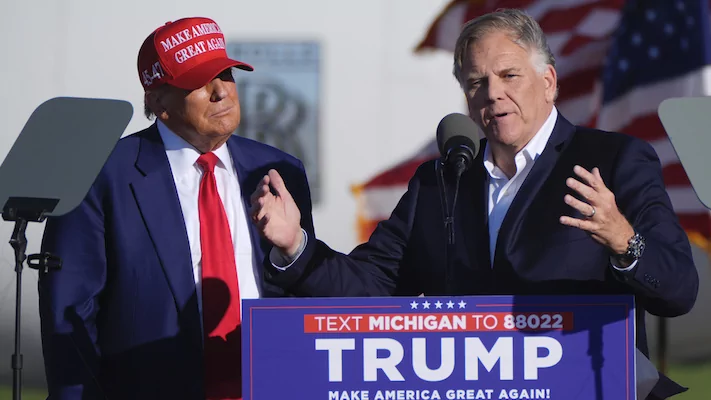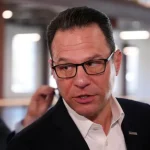

EXCLUSIVE — Former Rep. Mike Rogers, who is running for Senate, said that he supports a proposal that would give the president power to impose reciprocal tariffs.
Rogers, who served in Congress from 2001 to 2015, including as chairman of the House Intelligence Committee, told the Washington Examiner during an interview that he supports former President Donald Trump’s push to pass the Reciprocal Trade Act, a law that would give the president further control over the tariffs that the United States imposes.
Still, notably, Rogers did not go as far as endorsing the idea of 10% across-the-board tariffs — an idea that Trump has floated and would be a tectonic shift in U.S. trade policy and a massive departure from supply-side economics that have long dominated the Republican Party.
But Rogers said he likes the reciprocal tariff plan, which would allow the president to unilaterally impose tariffs of equal size placed by other countries on the U.S.
“If you have a tariff on a product, we should be able to match that product,” Rogers said. “That would be my preferred way to do it, and I think that is wholly appropriate.”
“I’m a free-market guy, but that’s not a fair market when they can charge a tariff and we don’t,” Rogers added.
Rogers, 61, is the Republican front-runner in the GOP Senate primary, which will be held next month. A RealClearPolitics average of polls shows he is leading former Rep. Justin Amash by a large degree. Amash is known as a libertarian.
Rogers brushed Amash aside during the interview, pointing out how Amash left the GOP while in Congress. Amash became an independent in 2019 and then joined the Libertarian Party in 2020 before announcing his candidacy in the GOP Senate primary earlier this year.
Rogers, who served as a special agent with the FBI prior to entering Congress, also said on Tuesday that he preferred lower taxes. A major agenda item for Republicans is extending or making permanent provisions in the 2017 Tax Cuts and Jobs Act that have expired or are set to expire next year.
“There’s no tax cut I don’t like,” Rogers said.
He also expressed some openness to a lower corporate tax rate but said a decision on that would need to be closely examined in the broader context of tax policy.
“I would look at the number and see how we would balance it out with everything else we are trying to accomplish,” Rogers said. He added that a corporate tax is a tax on jobs “period, pure and simple.”
The former congressman said it is a priority to keep companies in the U.S. rather than losing them to low-tax jurisdictions. The 2017 tax overhaul lowered the corporate tax rate from 35% to 21%. Democrats generally favor raising it. Trump has called for lowering it further. In recent months, though, some Republicans have suggested that the rate might be allowed to rise to pay for other priorities, a development that reflects the populist pressures at work on the party.
The Medicare trust fund will be exhausted in 2036, and the combined Social Security trust fund will become exhausted in 2035, the programs’ trustees projected in May. Rogers said it is crucial that the issue is addressed and thinks that the only way to do so would be to create “a true bipartisan commission” and implement whatever recommendations the panel has.
The idea of a bipartisan fiscal commission is one that got attention last year thanks to the support of House Speaker Mike Johnson (R-LA), who endorsed such a panel.
In January, the House Budget Committee voted to advance bipartisan legislation that would form a panel consisting of both Republican and Democratic lawmakers from both chambers of Congress, in addition to outside experts. The committee would work to produce a report and propose legislation that would stabilize the ratio of public debt to GDP to at or below 100% within 10 years.
But the politics are tricky. Some lawmakers have embraced the idea, but others have shied away over perceptions that they could be seen as wanting to cut Social Security and Medicare.
On the energy front, Rogers supports “all of the above” energy policies. Like most GOP candidates this election cycle, he wants to boost domestic production of energy.
Rogers is also “absolutely” a fan of nuclear energy and said he wants to see that capacity built out across the U.S. He pointed specifically to small modular reactors, which are smaller in size than traditional nuclear reactors. Because of their smaller size, SMRs are safer and less cost-prohibitive. He also pointed out that nuclear power is clean.
“I think they can be a quick energy solver for us, certainly would impact carbon in the air, it’s a zero-emission energy, and it’s something that we can do internal to the United States,” Rogers said.
CLICK HERE TO READ MORE FROM THE WASHINGTON EXAMINER
Rogers also blames the Biden administration for the country’s worst bout of inflation in decades. He believes too much federal spending under Biden caused the inflation wave and that such spending needs to be reined in.
If he clinches the Republican nomination on Aug. 6, Rogers is expected to face Rep. Elissa Slotkin (D-MI) in the general election. Slotkin is currently polling ahead of Rogers in the general election, according to RealClearPolitics.





